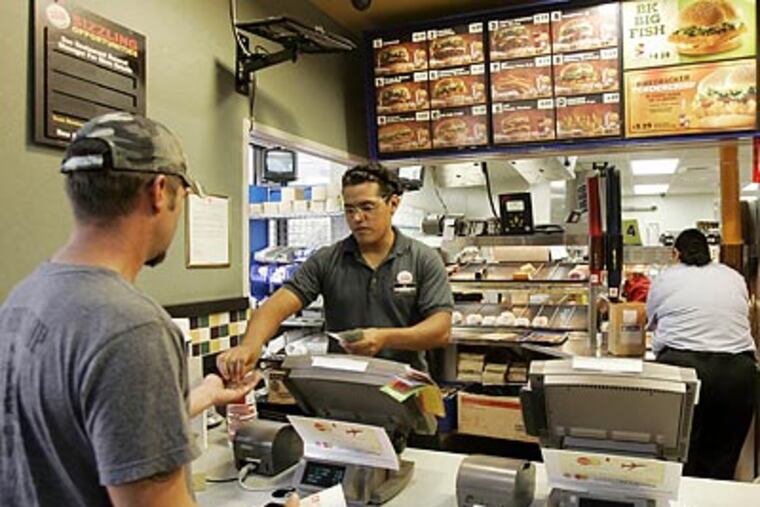
"FOOD, INC." was not an easy movie to make. Director Robert Kenner originally planned to talk to everyone involved in the food production process, from farmers to mega-corporations - but he kept hitting walls. "These people did not want to talk me," Kenner said. "They don't want you to know what you're eating."
"Food, Inc." pulls back the curtain on the industrial food system in the United States and connects the dots between factory farming and E. coli outbreaks, government subsidies and the diabetes epidemic - even slaughterhouses and illegal immigration. Kenner summarized it simply: "The system is broken."
While the documentary, which opens in Philadelphia on Friday, urges consumers to think carefully about food, the goal was never to turn everyone into vegans. "I don't want to tell people what to eat," Kenner explained. "I want people to have a right to know what's in their food."
Once you know though, you might just think differently about that chicken breast.
Tyson, Perdue and most of the farmers under contract to them refused to talk to the filmmakers, but they managed to get the story anyway. A farmer who casually mentioned that he raises about 300,000 chickens at a time received a cautionary visit from company representatives. And the one farmer who let Kenner film inside her chicken coop - a teeming, filthy barracks where corpses are mixed among live chickens too fat to stand - promptly lost her contract.
Although the film includes plenty of stomach-turning scenes, Kenner was most appalled by the industry's secrecy, saying he encountered resistance just for trying to collect information.
He said that his most shocking moment came not in a slaughterhouse but in the California state legislature, where he filmed a debate about a bill that would require meat and dairy products from cloned animals to be labeled as such. (It passed in the legislature but was vetoed by the governor.) "I didn't even know there was cloned meat," he said. "When that industry lady says [in the film], 'I think it would be too confusing for the consumer to have this information,' I got goosebumps."
Kenner created "Food, Inc." to help Americans make up their own minds, without shying from the backstory that the food industry seemed so determined to hide. "If you're being denied that information, you're being denied the right to make good choices," he said.
Throughout the documentary, Kenner reveals the vast gulf between how our food is produced and how its production is represented to us: Idyllic, pastoral images and quaint brand names fill the shelves of grocery stores, when - in reality - most of the food we buy is produced by just a few corporations in an industrial system that has virtually nothing in common with the farms of yesteryear.
"It was a real threat to them to have me wanting to talk about food," Kenner said. "It violated this myth that's being propagated: that our food comes from a small farm."
He compared the massive industrial food system to the banking system; both, Kenner claimed, are fundamentally unsustainable. "I think the food system can fall off a cliff just as much as the financial system fell off a cliff," he said. "It's a system that's absolutely, certainly as unrealistic as our credit system."
The film tries to raise the alarm, and while it has already been screened for the U.S. Department of Agriculture, the U.S. Food and Drug Administration, and Secretary of Agriculture Tom Vilsack, Kenner emphasized that any real change has to begin at a grassroots level. "I do believe there's a movement evolving," he said. "People are going to start demanding this information, to know what we're eating."
And while "Food, Inc." sets out to expose the food industry's corruption and unsustainability, it ends on a hopeful note. "There's something off with the system," Kenner said. "But you know what? It's going to crack." *